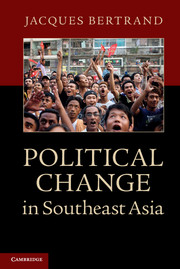1 - Understanding political change in Southeast Asia
Published online by Cambridge University Press: 05 June 2014
Summary
Southeast Asia is a vast region, comprised of eleven countries and incredible diversity. From one country to the next, dominant languages vary, religious groups are different and histories are all dissimilar from one another. In comparison to Latin America or Africa – other large regions of the world – the study of politics in Southeast Asia can be particularly challenging.
Latin America and Africa are also very diverse regions but their respective countries share some similarities that make comparisons somewhat more common. The Spanish language, for instance, binds countries of Latin America where it is dominant in all countries except Brazil. Countries of the region were all colonized, and Spain was the dominant power for several centuries. Latin American countries inherited societies in which descendants of Spanish colonizers and mestizo (mixed) classes are now dominant. These common characteristics often tainted their style of politics, with some very interesting parallels among several countries. To a lesser extent, the African experience also generated similarities that have been compared analytically. In Africa, the division of the continent between mostly French and British colonial rule created some homogenizing experiences as well. French and English became common languages of communication throughout West and East/Southern Africa respectively. Colonization by these powers, which imposed bureaucratic structures over societies mostly organized in small political units, created some similar dysfunctionalities that have persisted in the modern independent states (Mamdani, 1996; Young, 1994). Comparisons have often been made between clusters of African countries, where the continued legacies of colonial rule have been blamed for the inability of states to overcome poverty and other major challenges in the continent.
- Type
- Chapter
- Information
- Political Change in Southeast Asia , pp. 1 - 30Publisher: Cambridge University PressPrint publication year: 2013



